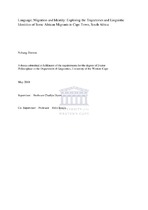| dc.description.abstract | This study is an exploration of the different trajectories of a selected number of African migrants into and around South Africa, focusing on the effects of these different trajectories on their language use patterns and linguistic identities. Informed by the interpretive paradigm, the study was done in order to show the effects of space, migration, trauma and ethno-linguistic tensions such as xenophobia on people's language use. Ultimately, the study is an analysis of a number of migrants' language biographies. South Africa is a multilingual and multicultural country with eleven official languages and many migrant languages, resulting from the flow of people from other countries, especially from highly multilingual and multicultural African countries, to this major economic hub on the continent. New trends in globalization witnessed across the globe and socio-political and economic instabilities witnessed in some countries, have prompted some of these migrants to move to South Africa, they see as more economically and politically stable than their home countries. Among those who have migrated to Cape Town South Africa are Cameroonian migrants whose living conditions will never be the same again.
The study was conducted because there is a need for a better understanding of the strategies multilingual people employ to negotiate language and cultural differences in a globalized world, often under very trying conditions (as is the case in South Africa). The study critically explores the language biographies, the full repertoire of communicative resources of selected Cameroonian migrants in Cape Town as well as making visible their polylingual repertoires and associated attitudes and beliefs in the research domain. The theoretical framework for this study is shaped by theories of late modernity with reference to traditional sociolinguistics, globalization and migration. A multi-dimensional analytical approach is employed in this study, incorporating Discourse Analysis (DA), Narrative Analysis (NA), Critical Discourse Analysis (CDA), Thematic Analysis (TA) and Multimodal Discourse Analysis (MDA) that incorporates the Multimodal Biographic Approach. | |

